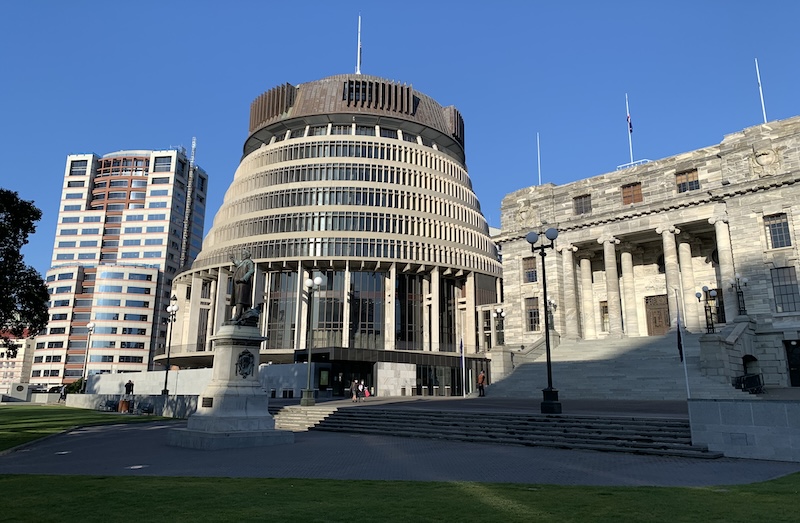Even if some students are now just texting on their laptops. Stewart Sowman-Lund writes in this excerpt from The Bulletin, The Spinoff’s morning news round-up. To receive The Bulletin in full each weekday, sign up here.
It’s been a week since phones were forcibly banned at schools
Last August, in the heat of the election campaign, high schooler Caspar Levack argued on The Spinoff that National’s (then) proposed phone ban was going to be a terrible idea. “Ultimately, if the teacher thinks you are being distracted by your phone during class, they will tell you to turn it off,” he said. He argued social media companies were the real problem – they should be who the government goes after. “Properly regulating social media companies would be popular policy that makes the government look really good. Why not do that instead?”
Several months later, schools nationwide have been forced to ban phones (though many were already doing it since the start of the year). The arguments for and against have been widely traversed (here is an edition of The Bulletin from last year that lays it all out) and now schools must grapple with how to actually enforce the rules. So how are schools and educators finding the policy in practice? We asked a few.
A broadly positive move
Teachers who have public profiles via their involvement with teacher organisations or unions are of course just a small subsection of the education community, but they provided an interesting range of answers. Most told The Bulletin they had already noticed a positive impact from the phones away policy. Vaughan Couillault, president of the Secondary Principals’ Association and principal of Papatoetoe High School, said the policy has “landed well” with the community and been followed by most students. “The aim was to reduce distraction to improve achievement and progress – it is too early to tell the impact at this point with regard to this, but feedback has been generally positive thus far,” he told me. Kaitaia College principal Louise Anaru agreed, having implemented the ban at the start of the year. “Parents are on board with the change. Some students are finding the change difficult. It will take time to learn these new behaviours for some and we will continue to put support in place to ensure successful implementation of the new policy.”
One Auckland student told RNZ last week that the ban was just adding to anxiety at school. If teachers haven’t managed to stop students from vaping in the classroom, “how are they supposed to stop phone usage?” John Gerritsen’s report also highlighted some cheeky comments from school students on Christopher Luxon’s TikTok videos. This piece from The Conversation looks at the global context for the ban, and is worth a read.
A ‘cracker’ of a policy
Azaria Howell at Newstalk ZB (paywalled) has the inside scoop on the official advice from the Ministry of Education to the government on implementing the ban. It warned that a full ban “may not be warranted” while the ministry’s schools policy general manager Jennifer Fraser said there was “mixed evidence” it would work at all.
But education minister Erica Stanford has called the first week of the scheme an overwhelming success. “Principals have been writing to me every day, telling me how wonderful it is to hear the noise in the playground,” she told The Bulletin. Some of those emails were supplied to us, with one principal telling Stanford the phone ban was a “cracker” of an initiative. “There’s something about having a nationwide edict that’s made it so much easier for us to shift the culture in schools,” they told Stanford. Labour’s Jan Tinetti, meanwhile, said the party had heard some schools struggling with enforcement of the rules. “A government-enforced ban takes this choice away from local communities who’ll know what works best for their students,” she told me.
- ICYMI: The Spinoff’s Tara Ward takes a look at why parliament – the most unruly classroom of all – should perhaps ban phones next.
Just one small part of a wider education overhaul
Stanford has quickly emerged as one of the high achievers of the Luxon administration. Last week, as part of a pre-budget announcement, Stanford also confirmed that the government’s plans to mandate structured literacy would be coming into force at a cost of $67 million.
Some schools, 1News reported, have taken issue with the rate at which these changes have been pushed on schools. Along with phone bans and proposed changes to literacy, there’s the mandated hour of reading, writing and maths every day. There’s also the amorphous proposal to “restore balance to the Aotearoa New Zealand Histories curriculum”, which you can read more about here. On The Spinoff this morning, primary school teacher Jessie Moss argues that teachers don’t want the curriculum “balanced” and responds to comments Stanford made on RNZ last month.
Read more
Finally, if you’re wondering what high schooler Caspar Levack makes of the plan now it’s in force? He’s still not convinced. “It’s not surprising that the ingenuity of students avoiding work has provided no shortage of ways to avoid the new phone ban, for example people are just texting on their laptop now,” he says.





















Discussion about this post